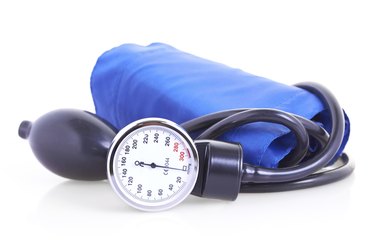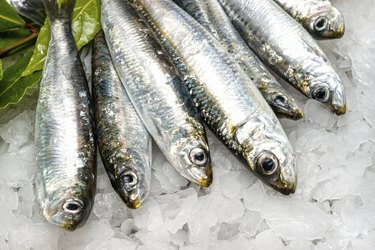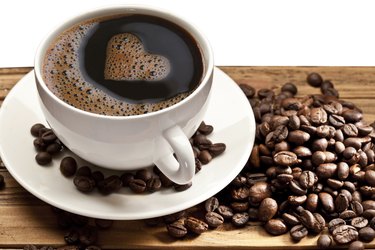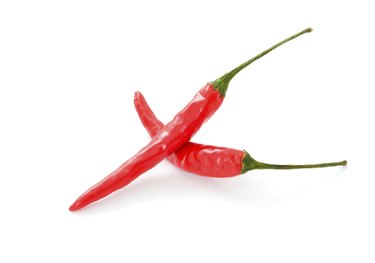
Your metabolism, temperature, heart action and digestion are all controlled by the sympathetic nervous system, or SNS, and the parasympathetic nervous system. Ideally, these two systems are balanced, but either system can become overactive and cause problems. An overactive SNS can increase anxiety and cause other symptoms. Although there is no specific diet for the SNS, what you eat and drink can increase or decrease its activity.
The Sympathetic Nervous System
Video of the Day

The SNS manages your response to stress and danger; it increases adrenalin and your metabolic rate in what is commonly called the "fight-or-flight" response. Your body prepares for danger with an increased heart rate, dilation of the lungs to maximize air intake and an increase in glucose metabolism to assure the brain and muscles have adequate fuel. An overactive SNS can keep you in a constant "fight or flight" state and cause high blood pressure, heart failure and major depression.
Video of the Day
Diet and the SNS

Dr. Lawrence Wilson, a physician and nutritional consultant who specializes in nutritional balancing, recommends animal protein that includes fats, omega-3 and omega-6 essential fatty acids to decrease an overactive SNS. He suggests that you eat such foods as sardines, salmon, eggs, meats, nuts and root vegetables. Wilson also recommends foods that are good sources of B-complex vitamins, such as nutritional yeast, meat and eggs. He further suggests that you ensure your diet has sufficient calcium, magnesium and zinc.
Caffeine

Some individual items in your diet can affect the SNS. Caffeine is a well-known and readily available legal stimulant that activates the SNS and increases blood pressure. Researchers reported in the American Heart Association's November 2002 issue of "Circulation" that people who don't usually drink coffee responded to coffee intake – whether caffeinated or decaffeinated – with an increase in blood pressure from SNS activation.
Alcohol

Alcohol increases SNS activity. A study in the June 1995 "New England Journal of Medicine" measured SNS responses in healthy test subjects who were given alcohol intravenously. Study participants responded to the alcohol with several signs of increased SNS activation including an increase in blood pressure. Researchers reported sympathetic activity nearly doubled after participants received the alcohol infusion.
Capsaicin

An article in the December 2000 "Journal of Nutritional Science and Vitaminology (Tokyo)" examined the effect of capsaicin, the heat component of red peppers, on the SNS. People who ate the capsaicin meal had significantly lower sympathetic responsiveness if they had obesity compares with those who did not. A study reported in the March 2011 "Journal of Applied Physiology" found that rats that were given capsiate, a compound similar to capsaicin, increased SNS activity in a limited fashion affecting only the fatty tissue of the abdomen.
Considerations and Warnings

Symptoms of an overactive SNS, according to Dr. Wilson, include excess sweating, high blood sugar, elevated blood pressure and more frequent bowel movements. You may tend to be more outgoing, aggressive or even belligerent. You may also be prone to anxiety, irritability and nervousness or have an overactive thyroid gland. If you think you have an overactive SNS and are concerned about your diet, consult a health-care professional.
- New World Encyclopedia: Autonomic Nervous System
- American Journal of Pharmaceutical Education: Physiology of the Autonomic Nervous System
- American Heart Association: Sympathetic Nervous Activation in Essential Hypertension
- Journal of Hypertension: Sympathetic Activity in Major Depressive Disorder: Identifying Those at Increased Cardiac Risk?
- American Heart Association: Sympathetic Nervous System in Heart Failure
- The Center for Development: Autonomic Nervous System Health
- American Heart Association: Coffee Acutely Increases Sympathetic Nerve Activity and Blood Pressure Independently of Caffeine Content
- The New England Journal of Medicine: Suppression of Alcohol-Induced Hypertension by Dexamethasone
- Journal of Nutritional Science and Vitaminology (Tokyo): Effects of Capsaicin-Containing Yellow Curry Sauce on Sympathetic Nervous System Activity and Diet-Induced Thermogenesis in Lean And Obese Young Women
- Journal of Applied Physiology: Intragastric Administration of Capsiate, a Transient Receptor Potential Channel Agonist, Triggers Thermogenic Sympathetic Responses
Is this an emergency? If you are experiencing serious medical symptoms, please see the National Library of Medicine’s list of signs you need emergency medical attention or call 911.